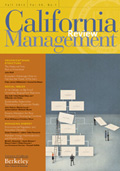 Outdoor clothing retailer Patagonia, footwear company TOMS, and organic yogurt maker Stonyfield Farm are among an emerging new class of “hybrid” companies that pursue social missions while relying on a commercial business model.
Outdoor clothing retailer Patagonia, footwear company TOMS, and organic yogurt maker Stonyfield Farm are among an emerging new class of “hybrid” companies that pursue social missions while relying on a commercial business model.
Although these hybrids bear strong promise, they are also fragile organizations that walk a fine line between achieving social goals and market requirements, according to authors of the Spring 2015 special issue of the California Management Review (CMR).
This new issue is one of the most comprehensive collections of research ever published on the emerging hybrid model.
The issue explores, among other topics, the definition and history of the hybrid model, tensions that these companies face by spanning categories; the critical role hybrids take in tackling global sustainable development; and a study of what motivates hybrids to change their legal structure while building their enterprises.
Many of these companies are drawing the attention of investors, said Nardia Haigh, guest editor of the issue and an assistant professor of management and marketing at the University of Massachusetts, Boston. The market for socially responsible investing these days is worth about $3 trillion, or around 12% of all managed funds in the United States, Haigh says.
Published quarterly by the University of California Berkeley’s Haas School of Business, the California Management Review is a top-ranked management journal that serves as bridge of communication between those who study management and those who practice it.
The full issue is now available online and around the Haas campus.
In addition, condensed versions of each of these articles will be made available to all Haas faculty, students, alumni, and board members through the new CMR Executive Digest initiative.